
Homelessness and the Problem of Public Land
Homelessness is problematic for cities. Massive amounts of transient people panhandling and sleeping on the sidewalks can be a nuisance to tourists and small businesses, and there can be associated crimes such as vandalism, trespassing, or public indecency. On the other hand, we must never forget that the homeless are people, with the same rights as you or I. They cannot simply be legislated out of existence, and we owe them the respect we give any of our fellow citizens.
Some cities have responded to this problem by banning people sleeping on public land, including sidewalks and parks. The city of Reno has even gone so far as to remove benches from parks to discourage homeless people from sleeping on them.
This raises an important point about the ethics of public land. Does the city have the right to prevent its citizens from using land that, theoretically at least, belongs to them? If homeless people live in a city, should they have just as much right to use that land as anyone?
Of course, it could be argued that, since the homeless pay little to no taxes, they do not really share in the ownership of public land. But the point of paying for land with taxes in the first place is to avoid a direct system of user fees. If the ability to use public land is dependent on how much you pay for it, then why not simply charge people to enter, like private businesses do?
These “no sleeping” laws apply to everyone, not just the homeless, so in that sense they are not technically discriminatory; nevertheless, they still clearly target a particular class of people who have nowhere else to go.
The difficulty in solving this problem stems from a fundamental failure in the concept of public ownership. If all land were in private hands, some owners could choose to allow the homeless, while others could forbid them. Charitable foundations and wealthy philanthropists could provide them with parks and open land on which they would be free to live, while others who find their presence disturbing would not be forced to endure it.
With regard to the public land that we all share, however, no matter what the solution, some people will always be unsatisfied. It’s the same problem faced by public schools forced to decide whether to teach certain controversial subjects, whereas a private system allows everyone an option to get what they want. Government is supposed to represent everyone, but any decision will necessarily alienate certain citizens. These decisions are made by majority rule, which creates a disgruntled minority who is not able to get its way. The private sector avoids this problem through competition. If you want your kids to learn about creationism, you can find a school that teaches it. If you want them raised purely secularist, there is a school for that too. If you don’t like Coke, there’s always Pepsi. And regardless of your position on accommodating the homeless, there will be some private landowner to satisfy you.
Public land also muddies the waters of trespassing laws and when they apply. In the case of private land, there is a clearly identifiable victim of trespassing. If you are on my land without my permission, you interfere with my ability to use it as I want. I have been wronged and am free to seek recompense. With public land, who is victimized by trespassing? It’s unclear, just as it’s unclear whether trespassing is even possible on land that we all own.
One could argue that the business owners and larger communities are victimized by the presence of homeless people, who may drive away tourists and customers, but it’s not obvious that those business owners have more of a right to use the land than the homeless people do. Most citizens would be okay with a small homeless population, but when the presence of street folk becomes too large, there is considerably more cause for concern. But with public land, there is no way to determine how much is too much, as each individual has as much right to the land as anyone else.
Private property solves this dilemma by giving every owner a clear right to decide who can use his land, in what numbers, and for what purpose. If all public lands were privatized, there we be no legal dispute over who is allowed to sleep where. Property rights alone clear up the confusion created by public ownership.
Regardless of whether cities have the right to criminalize homelessness, I personally find it wrong to punish people for a behavior that isn’t directly hurting anyone. Much of the time, the homeless just want to be left alone, and I see no reason why they shouldn’t get their wish.
This article originally appeared on Conservative Review.
Free the People publishes opinion-based articles from contributing writers. The opinions and ideas expressed do not always reflect the opinions and ideas that Free the People endorses. We believe in free speech, and in providing a platform for open dialogue. Feel free to leave a comment.

